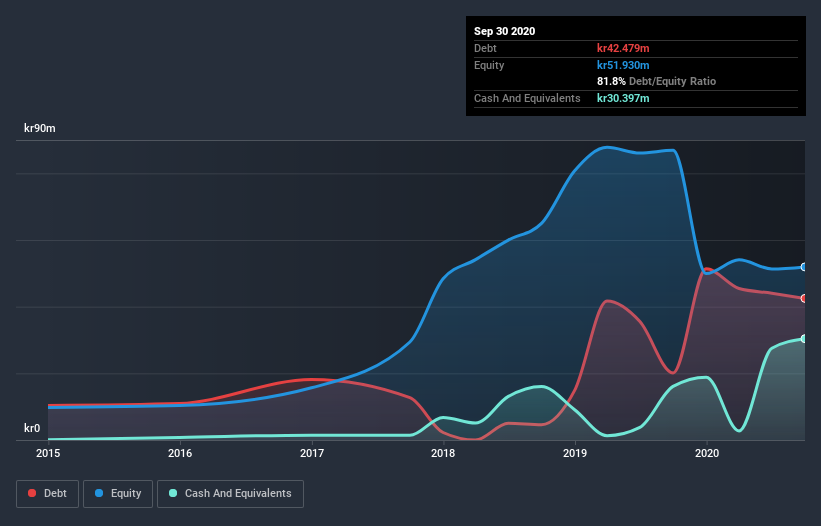Legendary fund manager Li Lu (who Charlie Munger backed) once said, 'The biggest investment risk is not the volatility of prices, but whether you will suffer a permanent loss of capital.' When we think about how risky a company is, we always like to look at its use of debt, since debt overload can lead to ruin. We can see that DevPort AB (publ) (STO:DEVP B) does use debt in its business. But the more important question is: how much risk is that debt creating?
Why Does Debt Bring Risk?
Generally speaking, debt only becomes a real problem when a company can't easily pay it off, either by raising capital or with its own cash flow. Part and parcel of capitalism is the process of 'creative destruction' where failed businesses are mercilessly liquidated by their bankers. However, a more frequent (but still costly) occurrence is where a company must issue shares at bargain-basement prices, permanently diluting shareholders, just to shore up its balance sheet. Of course, debt can be an important tool in businesses, particularly capital heavy businesses. The first step when considering a company's debt levels is to consider its cash and debt together.
View our latest analysis for DevPort
What Is DevPort's Debt?
You can click the graphic below for the historical numbers, but it shows that as of September 2020 DevPort had kr29.1m of debt, an increase on kr20.1m, over one year. But it also has kr30.4m in cash to offset that, meaning it has kr1.28m net cash.

A Look At DevPort's Liabilities
The latest balance sheet data shows that DevPort had liabilities of kr75.1m due within a year, and liabilities of kr39.1m falling due after that. On the other hand, it had cash of kr30.4m and kr51.5m worth of receivables due within a year. So it has liabilities totalling kr32.3m more than its cash and near-term receivables, combined.
Of course, DevPort has a market capitalization of kr191.0m, so these liabilities are probably manageable. However, we do think it is worth keeping an eye on its balance sheet strength, as it may change over time. Despite its noteworthy liabilities, DevPort boasts net cash, so it's fair to say it does not have a heavy debt load!
The modesty of its debt load may become crucial for DevPort if management cannot prevent a repeat of the 42% cut to EBIT over the last year. When a company sees its earnings tank, it can sometimes find its relationships with its lenders turn sour. When analysing debt levels, the balance sheet is the obvious place to start. But it is DevPort's earnings that will influence how the balance sheet holds up in the future. So when considering debt, it's definitely worth looking at the earnings trend. Click here for an interactive snapshot.
Finally, a business needs free cash flow to pay off debt; accounting profits just don't cut it. While DevPort has net cash on its balance sheet, it's still worth taking a look at its ability to convert earnings before interest and tax (EBIT) to free cash flow, to help us understand how quickly it is building (or eroding) that cash balance. During the last three years, DevPort generated free cash flow amounting to a very robust 88% of its EBIT, more than we'd expect. That positions it well to pay down debt if desirable to do so.
Summing up
Although DevPort's balance sheet isn't particularly strong, due to the total liabilities, it is clearly positive to see that it has net cash of kr1.28m. And it impressed us with free cash flow of kr31m, being 88% of its EBIT. So we don't have any problem with DevPort's use of debt. When analysing debt levels, the balance sheet is the obvious place to start. But ultimately, every company can contain risks that exist outside of the balance sheet. We've identified 5 warning signs with DevPort , and understanding them should be part of your investment process.
If you're interested in investing in businesses that can grow profits without the burden of debt, then check out this free list of growing businesses that have net cash on the balance sheet.
If you decide to trade DevPort, use the lowest-cost* platform that is rated #1 Overall by Barron’s, Interactive Brokers. Trade stocks, options, futures, forex, bonds and funds on 135 markets, all from a single integrated account. Promoted
New: Manage All Your Stock Portfolios in One Place
We've created the ultimate portfolio companion for stock investors, and it's free.
• Connect an unlimited number of Portfolios and see your total in one currency
• Be alerted to new Warning Signs or Risks via email or mobile
• Track the Fair Value of your stocks
This article by Simply Wall St is general in nature. It does not constitute a recommendation to buy or sell any stock, and does not take account of your objectives, or your financial situation. We aim to bring you long-term focused analysis driven by fundamental data. Note that our analysis may not factor in the latest price-sensitive company announcements or qualitative material. Simply Wall St has no position in any stocks mentioned.
*Interactive Brokers Rated Lowest Cost Broker by StockBrokers.com Annual Online Review 2020
Have feedback on this article? Concerned about the content? Get in touch with us directly. Alternatively, email editorial-team (at) simplywallst.com.
About OM:DEVP B
DevPort
Engages in the product development, production development and supply chain management, and digital solutions businesses in Sweden.
Excellent balance sheet and fair value.
Market Insights
Weekly Picks


The "Sleeping Giant" Stumbles, Then Wakes Up

Swiped Left by Wall Street: The BMBL Rebound Trade


Duolingo (DUOL): Why A 20% Drop Might Be The Entry Point We've Been Waiting For
Recently Updated Narratives


Hitit Bilgisayar Hizmetleri will achieve a 19.7% revenue boost in the next five years


GameStop will ace the financial crisis wave with its strategic Bitcoin investment and cash reserves


BABA Analysis: Buying the Fear, Holding the Cloud
Popular Narratives


A case for CA$31.80 (undiluted), aka 8,616% upside from CA$0.37 (an 86 bagger!).


NVDA: Expanding AI Demand Will Drive Major Data Center Investments Through 2026





